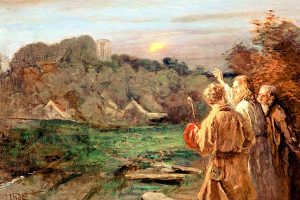Readings (Year A):
Deuteronomy 7:9 – 10, 13 – 14
Psalms 97:1 – 2, 5 – 6, 9
2 Peter 1:16 – 19
Matthew 17:1 – 9
Reflection: Share the memory
We live in a digital environment where nothing is forgotten. At least it seems that way. Anything we want to remember is just an internet search away or stored in our text messages and emails.
One of the messages of today’s Feast of the Transfiguration is the importance of memory, especially—something I think we forget while entangled in the world wide web—the importance of remembering together.
The second reading today, from 2 Peter, recalls the transfiguration. The authorship of this letter is debated, but even if the author of the epistle wasn’t Peter, but someone writing in his honor or a student preserving his wisdom and memories, the account still transmits the clarity and power of Peter’s memory of this mysterious moment on the mountain.
“We had been eyewitnesses of his majesty,” he writes: “When that unique declaration came to him from the majestic glory, ‘This is my Son, my beloved, with whom I am well pleased.’ We ourselves heard this voice come from heaven while we were with him on the holy mountain.”
Peter’s recollection closely mirrors the accounts of the transfiguration in the gospels of Mark, Matthew, and Luke. Whatever vision Peter, James, and John saw on that mountain, its beauty and its power resonated with them deeply; it stood out to them as important and essential, which is why they recall it so vividly. Clearly, they reminisced about that moment, often, together, telling each other the story over and over again. Because an important part of having an experience is remembering it. And remembering it together.
So how about those tents? Why didn’t Jesus want Peter to build those shelters on the mountain?
For a month this summer, I was working in Jerusalem—the holy city—in what Christians often call the Holy Land. Yet, if there’s one thing that Jerusalem can teach us, it’s that no building lasts forever. Roman ruins are covered up by crusader remnants, Byzantine shrines become toppled columns on the side of a highway. Magnificent shrines built by empires prove to be as temporary as Peter’s tents.
Tents, or temples, are not a fitting monument to God’s glory. In the Holy Land, there are many shrines built over holy sites. But what makes a site holy is not the building itself, not the gold, not the marble, not the iconography or art—as magnificent as it may be—but the memory of believers, the community of people who have gathered in these places throughout the centuries to recall together: “we have seen his glory.”
Christ’s glory is not held in one physical location on Mount Tabor, Mount Zion, or in the Church of the Holy Sepulchre. Rather, that glorious vision of Christ is memorialized, passed on, in our memories, and in the memories of the followers of Christ. We are told, each mass, the original command of Christ’s followers, to “do this in memory of me.” They beheld his glory, and we do, too, even now, two thousand years later, as we recall it, and remember it together.
The Eucharist—the community’s shared anamnesis or remembering of Christ’s sacrifice and Christ’s revelation of himself in glory—makes Christ truly present in our world. Rather than building a monument in response to holiness, we are called to become the living stones. Our lives, our hearts, and our communities are called to become a testament to the transfiguration we have seen. The church is not real estate. We don’t need to pitch a tent. We just have to go out and share the memory.













Add comment